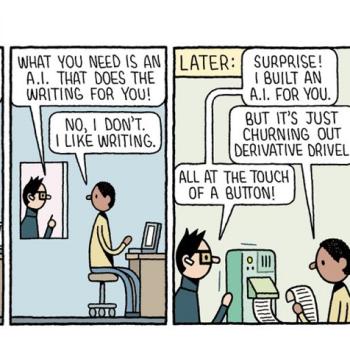Someone posted questions from a high school student in a Facebook group that I am part of. Here are the questions with my answers, in case anyone else finds them interesting:
Let me offer my own answers:
How long are the days in Genesis 1?
ANSWER: The text is referring to literal days, but the order is due to parallelism, and they are part of a depiction of God having a working week, which I consider anthropomorphism. “How long are the days” seems to me to be an unhelpful question. One of Jesus’ parables might refer to a day, and mean it literally, but that would not mean that the story itself is not symbolic.
How old is the earth and life and why?
ANSWER: The scientific answer, supported by evidence from geology, genetics, paleontology, astronomy, and many other scientific disciplines, is the best answer we can give at present. Trying to offer a different answer based on the Bible’s genealogies is a mistake. Try comparing Matthew’s genealogy of Jesus to his source material in Chronicles, and counting the number of generations carefully, and you will hopefully get my point.
Did man and apes come from a common ancestor?
ANSWER: Yes. You should learn more about the evidence for chromosomal fusion in our chromosome #2 if you are not already familiar with it. Ken Miller offers a good treatment of the topic in his books.
Were Adam and Eve real people?
ANSWER: Adam means “Human” in Hebrew, it isn’t a name – our English name Adam derives from treating it as such. If the character in Genesis 2-3 were named “Human” it would help readers grasp more quickly that this is a story about what it is like to be human, not about just a particular first human or human couple. I note the irony involved in approaching the text as though it were about “them, not us.” Many today blame Adam and Eve for the mess we are in. But the end of the story in Genesis 3 highlights blameshifting as one symptom of the breakdown of human relations. When creationists use the story to shift blame onto these two symbolic people, they are, ironically, doing that which the story highlights as inherently sinful.
Would you have answered any of these questions differently? Anything that you think I should have mentioned but neglected to? How would you have responded to them?












